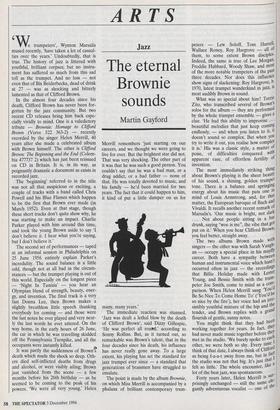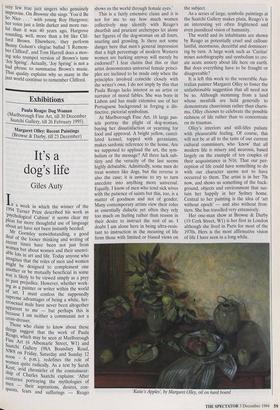ARTS
Jazz
The eternal Brownie sounds
Martin Gayford
We trumpeters', Wynton Marsalis mused recently, 'have taken a lot of casual- ties over the years.' Undoubtedly, that is true. The history of jazz is littered with youthful, brilliant corpses; but no instru- ment has suffered so much from this sad toll as the trumpet. And no loss — not even that of Bix Beiderbecke, dead of drink at 27 — was as shocking and bitterly lamented as that of Clifford Brown.
In the almost four decades since his death, Clifford Brown has never been for- gotten by the jazz community. But two recent CD releases bring him back espe- cially vividly to mind. One is a valedictory tribute — Brownie: Homage to Clifford Brown (Verve 522 363-2) — recently recorded by the singer Helen Merrill, 40 years after she made a celebrated album with Brown himself. The other is Clifford Brown: The Beginning and the End (Colom- bia 477737 2) which has just been reissued on CD in Britain. It is, in its way, as poignantly dramatic a document as exists in recorded jazz.
The 'beginning' referred to in the title was not all that auspicious or exciting, a couple of tracks with a band called Chris Powell and his Blue Flames which happen to be the first that Brown ever made (in March 1952). Even at that stage, though these short tracks don't quite show why, he was starting to make an impact. Charlie Parker played with him around this time, and took the young Brown aside to say 'I don't believe it. I hear what you're saying, but I don't believe it.'
The second set of performances — taped at an informal session in Philadelphia on 25 June 1956 entirely explain Parker's incredulity. The sound balance is a little odd, though not at all bad in the circum- stances — but the trumpet playing is out of this world. Especially on the longest piece — 'Night In Tunisia' — you hear an Olympian blend of strength, beauty, ener- gy, and invention. The final track is a very fast Donna Lee, then Brown makes a slightly breathless little speech thanking everybody for coming — and those were the last notes he ever played and very near- ly the last words he ever uttered. On the way home, in the early hours of 26 June, the car in which he was travelling skidded off the Pennsylvania Turnpike, and all the occupants were instantly killed. It was partly the suddenness of Browne death which made the shock so deep. Oth- ers died self-inflicted deaths from drugs and alcohol, or were visibly ailing; Brown just vanished from the scene — a few months before his 26th birthday — as he seemed to be coming to the peak of his powers. 'We were all very young,' Helen Merrill remembers 'just starting on our careers, and we thought we were going to live for ever. But the brightest star did not. That was very shocking. The other part of it was that he was such a good person. You couldn't say that he was a bad man, or a drug addict, or a bad father — none of that. He was totally devoted to music, and his family — he'd been married for two years. The fact that it could happen to him, it kind of put a little damper on us for many, many years.'
The immediate reaction was stunned. 'Jazz was dealt a lethal blow by the death of Clifford Brown', said Dizzy Gillespie, 'He was perfect all round,' according to Sonny Rollins. But, as it turned out, so remarkable was Brown's talent, that in the four decades since his death, his influence has never really gone away. To a large extent, his playing has set the standard for jazz trumpet ever since — a standard that generations of brassmen have struggled to emulate.
The point is made by the album Brownie, on which Miss Merrill is accompanied by a phalanx of brilliant contemporary trum- peters — Lew Soloff, Tom Harrell, Wallace Roney, Roy Hargrove — all of them, to some extent Brown disciples. Indeed, the same is true of Lee Morgan, Freddie Hubbard, Woody Shaw, and most of the more notable trumpeters of the past three decades. Nor does this influence show signs of slackening: Roy Hargrove, b. 1970, latest trumpet wunderkind in jazz, Is most audibly Brown in sound. What was so special about him? Torrie Zito, who transcribed several of Brown's solos for the album — they are performed by the whole trumpet ensemble — gives a clue. 'He had this ability to improvise . • • beautiful melodies that just keep coming endlessly, — and when you listen to it, it doesn't sound so complex. But when you try to write it out, you realise how complex it is.' His was a classic style, a matter .of poise, of difficulties conquered with, apparent ease, of effortless fertility ea invention.
The most immediately striking thing about Brown's playing is the sheer beautY of his sound, a shining, golden trumpet tone. There is a balance and springing energy about his music that puts one 01 mind of Louis Armstrong, and, for that matter, the European baroque of Bach and Vivaldi. It recalls another recent remark of Marsalis's. 'Our music is bright, not dark . . . Not about people sitting in a bar drunk, saying "woe is me", the vibe that got put on it.' When you hear Clifford Brown, you feel better, straight away. The two albums Brown made with singers — the other was with Sarah Vaugb" an — occupy a special place in his maytlY career. Both have a sympathy betwee,e human and instrumental voice which hasn occurred often in jazz — the recordings that Billie Holiday made with Lester Young, and Bessie Smith with the trunr peter Joe Smith, come to mind as a conro" parison. When Helen Merrill sang 'You u Be So Nice To Come Home To' (You'd be so nice by the fire'), her voice had an irre" sistibly youthful mixture of the hip and Ode tender, and Brown replies with a gran flourish of gentle, sunny notes. You might think that they had bee a working together for years. In fact, theY had never made music together before theY met in the studio. 'We barely spoke to eaelli other, we were both so shy. Every time think of that date, I always think of odor': as being f-a-a-r away from me, but in foe; the studio was not that big. It's just that 'I felt so little.' The whole encounter, like a lot of the best jazz, was spontaneous. Forty years later, Helen Merrill is sur: prisingly unchanged — still the same elLe., gantly adventurous vocalist — one of very few true jazz singers who genuinely improvise. On Brownie she sings 'You'd Be So Nice . . . ' with young Roy Hargrove; her voice just a little darker and more rue- ful than it was 40 years ago, Hargrove sounding, well, more than a bit like Clif- ford Brown. Elsewhere, they perform Benny Golson's elegiac ballad 'I Remem- ber Clifford', and Tom Harrell does a mov- ing solo trumpet version of Brown's tune Joy Spring'. Actually, 'Joy Spring' is not a bad phrase to summarise Brown's music. That quality explains why so many in the Jazz world continue to remember Clifford.











































































 Previous page
Previous page